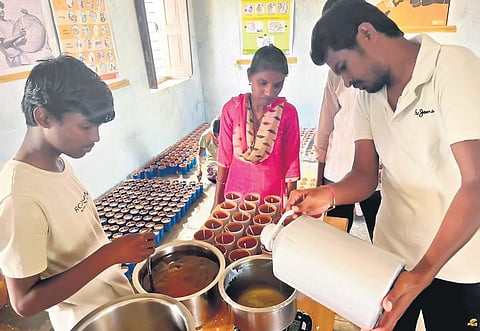

HYDERABAD: In a bid to provide an alternative source of income to members of the Chenchu tribes, a Particularly Vunerable Tribal Group (PVTG), the Amrabad Tiger Reserve (ATR) along with the Forest Department has begun distributing boxes to collect honey.
While the Chenchus are known as the hunting and gathering tribe and have been collecting honey for ages, their storage had remained a problem. “Honey collection is one of the traditional occupations for the tribe. However, with the declining bee population at an unsustainable rate due to climate change and habitat loss, it has become a problem. Bees collect nectar from two million flowers to make 1 pound of honey.
Consequently, the Chenchu community too has to search for hours to gather honey,” Rohit Reddy Gopidi, Nagarkurnool District Forest Officer (DFO), tells TNIE. “One of the major issues faced by the hive workers during the process of apiculture are the wooden honey boxes being infected from the insects and threat from animals such as sloth bears,” he adds.
He says they distributed the indigenous queen bee, Apis Cerena, to the villagers so that they can build their own honeycombs. “We have distributed around 110 boxes in Mallapur, Rampur, Behrapur and Attapur, apart from providing honey extractors, which will help in collecting honey from the boxes,” the DFO explains. “With the help of these boxes, they can now produce honey from the comfort of their homes and sell it at the price they decide,” he says.
Skilling initiative
A green skilling initiative has also been started by the Apollo Foundation in collaboration with Forest Department. The skill centre located in Mannanur under Total Health, an Apollo Hospitals initiative, is a candle-making centre where people from the Chenchu tribe handcraft container candles and taper candles from beeswax foraged from the forest, helping provide a steady income to community members.
Apollo Foundation officials said, “The candle-making initiative at Total Health began in 2020. We started with selling candles for Christmas and New Year’s in 2021, and in 2022, ahead of Diwali. There are currently 25 workers. We have trained 300 people in the craft since 2020.” “Making use of by-products such as beeswax provides greater economic benefit to the gatherers. The community was trained in making candles from the extracted beeswax to earn more for the same amount of foraging,” they add.
Chenchus either gather forest produce for a living or work as farm labourers. The green-skilling centre is an alternative that offers them a safe environment to work, allowing them to save wealth for the next generation. It is built on the periphery of the ATR, so that the women of the tribe need not travel long distances for their jobs. In fact, for many women at the Total Health green skilling centre in Amrabad, it is their first job, offering them a path to financial well-being and stability,” says Upasana Kamineni Konidela, vice chairperson, Corporate Social Responsibility, Apollo Hospitals.